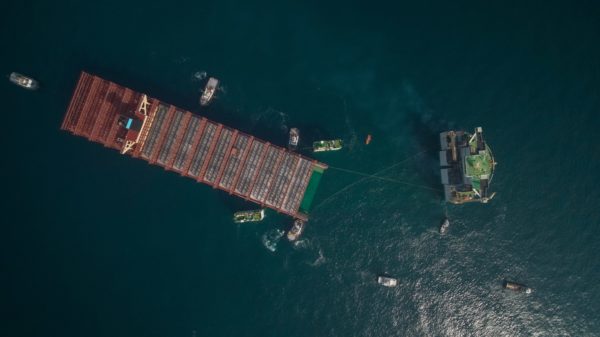Passengers boarding flights at almost any airport in the world today will be faced with significant security measures, including x-rays of luggage, scrutiny of travel documents and checks on stowed bags.
In contrast if you book a container load of hazardous chemicals, liable to heat up, explode and catch fire you can tell the carrier that it is a benign cargo, car parts or something similar, reduce the cost of transportation and avoid difficult questions.
Increasingly, however, the incidence of these containers catching fire has caused death and major injuries to crew, has resulted in significant environmental damage to the oceans and the atmosphere, cost the shipping line millions of dollars to repair the vessel, other shippers millions of dollars in lost cargo and sales and, if shippers are lucky enough to have their cargo returned they will pay a share in the repair of a vessel they did not cause damage to, will pay to store their cargo at a port they never wanted to go to and pay again to transport that cargo to its original destination.
This kind of incident….
Misdeclaration of container cargoes is causing criminal damage, to people’s lives, property and environment with not a single person expected to be charged for what should be regarded as a criminal act.
Maersk Honam is a case in point. Five crew lost their lives, others were injured the fire on the ship burned for days pouring out toxic smoke. The original container to ignite burned with enough intensity to ignite surrounding cargo and reached temperatures that the salvage company Smit said were hot enough to melt the structure of the ship.
It is to their credit that Maersk reacted quickly to the incident, ensuring families were informed and looked after, and that the vessel was attended by salvage companies and the Indian Coast Guard who helped to control and eventually extinguish the flames.
Lives were lost in this incident; many more lives were affected by it. But the owner of the cargo that caused the fire may never be known. Flagged on the Singapore registry the report into the fire on the vessel is eagerly awaited, though no news of its publication has yet been indicated.
Incidents such as the Maersk Honam, with varying degrees of severity, are occurring more regularly. In this campaign we are partnering the shipping industry to call for regulators to reappraise outdated fire regulations governing the onboard firefighting equipment and training for crew, so that regulations are fit for the design of modern ultra large container ships and more generally for purpose in the modern supply chain.
We are also calling for new methods to offer transparency in the container, a virtual glass wall that will allow carriers more certainty as to the contents of the container that they are carrying.
In addition, there needs to be a globally agreed sanction on those that deliberately misdeclare cargo so that when such a cargo is discovered the owner or those responsible will be held to account.
The international freight insurer TT Club has been at the forefront of efforts to minimise the problem at source, tightening procedures to identify misdeclared cargo and educating those declaring to do so in compliance with IMO-sanctioned codes of practice. “We welcome any visibility that the media can bring to the problem and the campaign to ensure greater safety,” commented Peregrine Storrs-Fox of TT Club.
Some pointers for the industry have already been agreed with ABS offering a detailed report on the issue in the autumn of 2019. The design of MSC’s latest fleet of ultra large container vessels such as the MSC Gűlsűn which has been designed with firefighting equipment that is situated high on the vessel’s infrastructure and can deliver significant amounts of water to any part of the ship. In addition, the vessel can flood a hold where fire has broken out to douse the flames without risking crew lives.
These are design measures that go beyond the current SOLAS regulations, were agreed with class society DNV GL and has led to the creation of a new notation FCS (c HAZID, FF HF) which was awarded to MSC for its new generation of vessels, it was announced by the class society on 18 February 2020.
On the 1 March 2020, Container News will be launching a dedicated campaign highlighting the issues around cargo integrity and the need for transparency. To contribute to the campaign, contact Nick Savvides, Managing Editor at n.savvides@container-news.com
www.container-news.com
www.container-news.com


